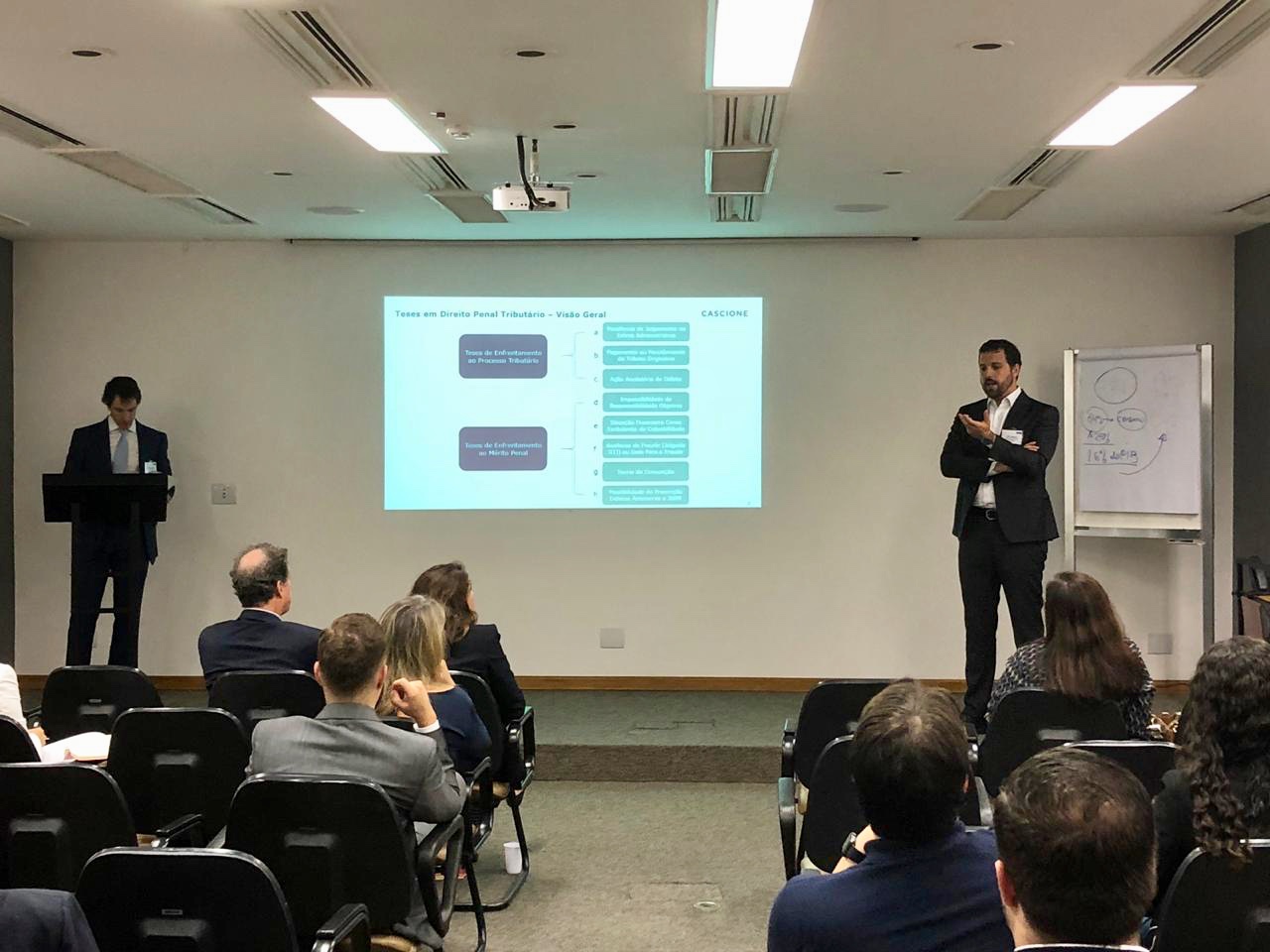On 20th September 2019, SWISSCAM held the traditional Legal Seminar with lawyers specialists in Tax Law to discuss two issues: “National and International Aspects of Tax Reform” and “Planning Tax and Criminal Responsibility”.
This is the second event held in the year focused on the Tax Reform, since reforms are being discussed at the Congress and are considered essential to stimulate the economy. Currently, the country has more than 5,000 different tax laws, creating a sense of legal insecurity and ambiguity. Brazilian companies spend an average of 2000 hours per year to calculate taxes.
The seminar began with a presentation by Maurício Barros, Partner of Gaia Silva Gaede and Associados, who compared PECs 45, 110 and 128. He focused more on the PEC 45 text which is at a more advanced stage in the Senate. “The big challenge of Tax Reform is to transform the current five taxes – ISS, IPI, ICMS, PIS and CONFINS – into one, IBS (Tax on Goods and Services).”
Maurício pointed out some positive aspects of the PEC 45, which may facilitate its approval in Congress:
– PEC is comprehensive, includes goods, services, leasing, intangibles and imports
– Tax rates will be uniform and management will be shared between Union, States and Municipalities
– Fast repayment of investment and export credits
– Transition period is 10 years
However, as the speaker said, there are several criticisms about these same points, especially about the uniformity of tax rates and the end of local incentives. There are political sectors that believe that the PEC offends the federal system, which gives autonomy to states and municipalities and this can make it difficult to approve the text. “Brazil has regional inequalities and one way to attract investment to these regions is to offer lower taxation. This is the case, for example, of the Manaus Free Zone.”
The lawyer Eduardo Fleury, from Fleury, Coimbra & Rhomberg Advogados, analyzed these subjects and compared Brazil’s situation to other countries. “The big problem in Brazil is that taxes are embedded in the price of the products and it’s hard to know what we are really paying for. Paying more taxes also means being able to enjoy more benefits. If we divide the taxes collected in Brazil per capita, Brazil spends more money on health and education than many rich countries. The main obstacle is social inequality.”
In addition, there are other criticisms about PEC 45 including the time of transition and the end of selectivity, as Eduardo explained. “Each product had a different tax burden. By standardizing tax rates, the sectors that paid the most taxes will pay less, while the sectors that paid the lowest taxes will pay more. This is a major obstacle to Tax Reform, as it could result an increase of prices of certain products.”
Erika Yumi Tukiama, Partner of Chiarottino and Nicoletti Advogados, spoke about how Tax Reform in Brazil is closely linked to Brazil’s bid to join the OECD (Organization for Economic Cooperation and Development). “To join the OECD, Brazil will have to follow 15 actions suggested by the OECD and this will bring changes in domestic legislation and international treaties.”
Erika brought a very important topic about digital services taxation, a subject that is still uncertain around the world. “With new players in the market, countries around the world are trying to regulate the taxation of digital services. This issue is also being considered in our Congress, but the creation of a digital services tax is not the best solution, since Brazil already charges this type of service, once the government withdraws taxes directly from the source.”
We heard in the second block the presentations by Leonardo Avelar and Luca Salvoni, Partners of the Cascione Pulino Boulos Advogados. Luca pointed out that even if the Tax Reform gets approved, the taxpayer will still have to face other problems, such as the tendency to criminalize non-payment of taxes. Leonardo Avelar, a criminal law expert, said that penalizing taxpayers is a way of the government to pressure companies to pay taxes even when the company is not wrong and owes nothing. “We advise our clients to wait until the end of the process, but many of them prefer to pay it anyway because of the embarrassment they feel.” He also cited STF (Supreme Federal Court) Binding Precedent 24 and the recent ruling of the STJ Superior Court of Justice (Brazil), which considered a crime of misappropriation not to pay declared ICMS values.
The seminar was very interesting, we received a very positive feedback from the presents. We thank the guests for the great quorum at the event and our associates: Cascione Pulino Boulos Advogados, Chiarottino and Nicoletti Advogados and Fleury, Coimbra & Rhomberg Advogados.
SWISSCAM is delighted to offer enriching discussions to our associates, especially on an issue that could change the future of the Brazilian economy and promote new business between Brazil and Switzerland.









